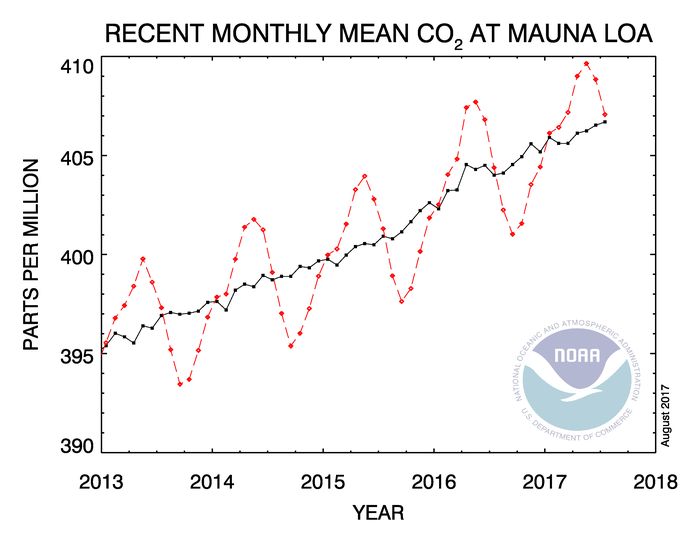|
Interview on Global Warming
October 10, 2008
Questions by Jun Jin, Plano West Senior High School
Answers by Dr. Victor M. Ponce, San Diego State University
1. Where do you stand on the issue of global warming? Is it caused by human activities
or by a natural cycle of the Earth?
There is every indication that global warming is caused by human activities.
The correlation between the increase in atmospheric carbon dioxide and the mean temperature of the Earth
is too strong to be dismissed as chance.
2. I have found information that states that the temperature was the warmest in
the Medieval Warm Period. Could you explain the contradiction between this data and
your data which states that 1998 was the warmest year?
I quoted the authoritative Goddard Institute of Space Studies (NASA)
when I said in my writings that 1998 was the warmest year of record. "Of record" refers to the contemporary record, which goes back to the late 1800s.
The global reach of the Medieval Warm Period has not been confirmed,
while the recent warming trend (the past 50 years) does appear to have a global reach.
3. How significant is the change in 1 ppm of carbon dioxide?
Atmospheric carbon dioxide grew from 190 ppm about 21,000 years ago, to 290 around 1900, to the current value of about 385 ppm.
In other words, the rate of increase of the past 100 years vastly exceeds any increase that happened in the past 21,000 years.
This is precisely the time when we started using the fossil fuels. Recall that the Ford model T-1 automobile was invented in 1903.
4. Some say that researchers fail to consider the other causes of global
warming such as the tons of methane that are dissolved in permafrost. Is the effect of
methane from permafrost significant?
If permafrost disappears due to warming, one cannot argue that the methane released is the cause of global warming.
5. How significant is a small change in average temperature of the air?
Temperatures of water vary from 0oC at freezing level to 100oC at boiling level.
However, the air temperature through most of the populated Earth has a much narrower range of variation. Most people would say that 12oC
is too cold and 28oC too hot, i.e., a comfort range of 16oC. Yet, for some people
the comfort range is much narrower, perhaps only 10oC.
In this case, a 1oC increase represents a 10% increase of the level of discomfort.
6. Is severe weather related to global warming?
Yes, severe weather means floods and hurricanes. Both are driven by evaporation from the ocean.
The vapor pressure of water (the tendency of water to evaporate to a gaseous form)
increases with temperature. Therefore, evaporation rates and amounts are greater where the temperature is greater.
7. Is it likely for the Earth to actually experience the changes of climate that are
mentioned in the movie "The Day After Tomorrow"?
The effects of global warming are likely to be gradual, not sudden. We have had global warming for 50 to 100 years.
If it were sudden, we would have taken some type of action much sooner. However, just because it is gradual does not mean that we should
sit passively. We have already done nothing for about 50 years. Dr. Roger Revelle taught Al Gore global warming in the
1970s. So the global warming discourse is not new; however, it is new to the general public.
8. Can the increase in the world's population contribute to global warming due to the
amount of carbon dioxide exhaled by humans?
We should distinguish between the burning of fossil fuels (anthropogenic)
and the burning of food by animals (natural).
Excess carbon dioxide in the air is attributed to nonrenewable fossil-fuel burning, and not to renewable food-fuel burning.
Even if this were not the case, a typical car burns about three times as much fuel as a typical human, so the impact of a car is much greater than that of
a human being.
9. Do you think there is a relationship between the global warming and three
recent hurricanes? (Hanna, Gustav, Ike).
Yes. There is no other explanation that makes sense. Water in the oceans evaporates at higher rates as the ambient temperature goes up.
The source of moisture is practically endless (all the water in the oceans). It is easy to see how a relatively small increase in ambient temperature could cause
a great increase in atmospheric moisture.
10. What do you think is the one best solution to mitigate global warming?
We should move away from our excessive reliance on fossil fuels to support our way of life.
Our first priority should be the development of renewable energy sources.
In the meantime, let's do whatever we can to reduce our carbon footprint.
For example, one flourescent bulb is four to six times more efficient than a comparable incandescent bulb.
So, let's replace the incandescent bulbs with fluorescent ones. Let's move proactively in the area of energy conservation,
particularly the energy that comes from fossil fuels.
| 